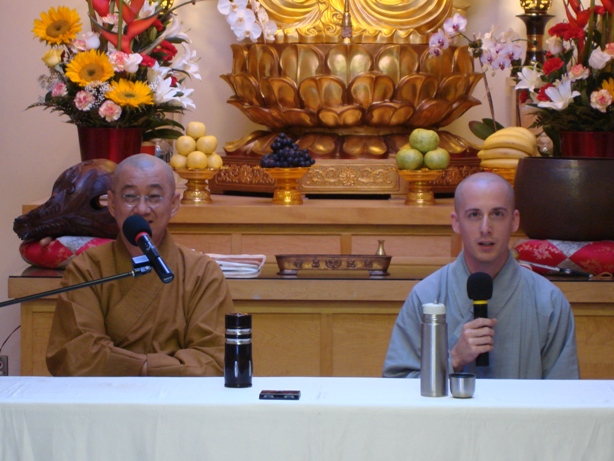| |

With the Coming of Chan, Problems are Gone
Talk translated by Venerable Chang Wen
By Chang Jie
09/21/2009

On Sunday, September 21, 2009, Venerable Chi Chern gave a talk at CMC entitled, "With the Coming of Chan,
Problems are Gone," which can be further translated as, "With Chan dharma, we can release ourselves from
being trapped or bound." Venerable taught how we become ensnared by our thoughts and generate vexations,
and gave instructions on how we can free ourselves from this bondage. This was the last of three talks
given by Venerable during a three-day visit, and the only one that was translated into English.
According to Venerable, many unpleasant situations are related to our interpersonal relationships, such as
those with family members and workmates. We may release negative energy in the forms of aggression, hatred,
or revenge, and so continue a vicious cycle, which can be seen as a type of cyclic existence or reincarnation.
During meditation, we may rehash past events, and experience anger or other negative emotions again and again,
follow these wandering thoughts, and add new elements to the story. We may add more elements of anger and revenge,
so that the wandering thoughts generate more vexations that are stronger and more powerful. We also generate
wandering thoughts based on things we like, and these thoughts also lead to the same kind of cyclic existence.
The goal of Chan practice is to end cyclic existence and wandering thoughts. Normally, we may do one of two things -- follow
our wandering thoughts or try to get rid of them, which may actually make the wandering thoughts stronger.
"The main
principle of Chan practice is to not follow wandering thoughts and not to try to get rid of them, but actually relax these
wandering thoughts, or let go of these wandering thoughts, put them down. If we are not following them, if we are not getting
rid of them, what do we do? We just don’t pay attention to them -- ignore them. But actually, in the beginning, we find that
this is difficult, so we either do one of the two -- follow them or try to get rid of them."
Venerable recommended that we use Chan practice to deal with wandering thoughts by calming the mind. The purpose of meditation
is to temporarily still wandering thoughts by settling the mind on an object, so that the mind becomes calm and still. The second
aspect of Chan practice is the practice of contemplation, or using wisdom to observe things. We should observe that all situations
arise due to causes and conditions, like links in a chain. "So with this observation, or the power of this contemplation, we begin
to see that we don’t have to continue this cyclic existence. We don’t have to continue to link the chain one after another and have
these vexations continue. We can see the nature of this cyclic existence, we can make a change, we can transform."
Through introspection, we can reflect on our own behavior and how it caused the situation we are experiencing, and on the fact that we
are creating more suffering when we follow our wandering thoughts. We can change our behavior, or not act on negative behavior, and vow
to change. We can choose to have a different way of interacting with others. For example, if we are with someone that we ordinarily have
a lot of conflicts with, instead of reacting to them, with wisdom, we can have a new way of interacting with them in a way that is harmonious,
or of benefit. We can transform vexations into bodhi, the aspiration for enlightenment or the compassionate bodhimind.

As we observe our mind, we can generate a sense of gratitude towards people that we have conflicts with, because we are able to see the vexations
that arise within us, how much of our problems are caused by ourselves, and as a consequence, improve ourselves by changing. “Instead of continuing
a vicious cycle of negative emotions, by observing the negative emotions and thoughts arising, we can transform them. By transforming them, this
cyclic existence can end.” Or, at least, these negative thoughts and emotions will weaken and diminish because we are not fueling them. We can
have this attitude of gratitude towards everyone, and towards all situations which generate vexations within us.
We should have this same approach to positive or memorable experiences. When we reflect on good experiences and their passing or loss, we may
generate sadness or depression, and get tangled by these negative emotions. Instead, we should make use of what we have learned, have a greater
sense of responsibility, and transfer what we learned to others. In this way, we can generate the power of determination and motivation to
transfer benefit to others and be liberated from states of mind that generate suffering. Thus, we can view loss as an opportunity to grow and
share teachings with others.
At the end of the talk, Venerable showed his paintings of the “Ten Moon Pictures,” inspired by the Ten Ox Herding Pictures, and gave gifts of
small stones with hand painted scenes to members of the audience.
|
|